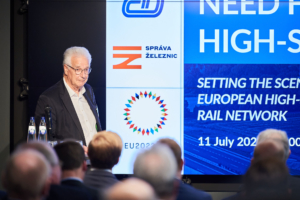On July 11th, EPF attended a high-level policy debate on high-speed rail. This event was jointly organised by CER (the Community of European Railway and Infrastructure Companies), České dráhy and Správa železnic in cooperation with the Czech Presidency of the EU Council. The Czech Minister of Transport, Martin Kupka, opened the debate, while other speakers included MEP Dorien Rookmaker, DG MOVE Land Transport Director Kristian Schmidt, EPF’s Christopher Irwin as well as ČD CEO Michal Krapinec and Správa železnic CEO Jiří Svoboda. The event was then followed by the CER Summer Cocktail.
The speakers discussed how European high-speed rail can help deliver a shift to more sustainable travel. But to reach the EU’s Sustainable and Smart Mobility Strategy’s ambitious targets of doubling (by 2030) and tripling (by 2050) high-speed rail traffic, we need to overcome “national high-speed islands” and build a pan-European network of high-speed connections, linking European capitals, major urban nodes and airports.
EPF’s Christopher Irwin stressed that public transport works best for people when it provides a seamless network of services – the first and last mile of any journey being no less important than the high-speed journey in between. A plan for a high-speed network must therefore be complemented by good local and regional connections.
And while infrastructure is important, we must also improve the entire passenger experience and listen to consumer needs. This includes elements like planning and booking journeys, service quality at stations and on-board trains, and good operational management when things start to go wrong. Passengers must be confident that they will reach their destination when their journey is disrupted, and at no extra cost, regardless of the operators involved, wherever in Europe they are travelling, and whatever tickets they have.



 Stay informed!
Stay informed!